Two-Time Oscar-Nominee Talks about His Latest Offering
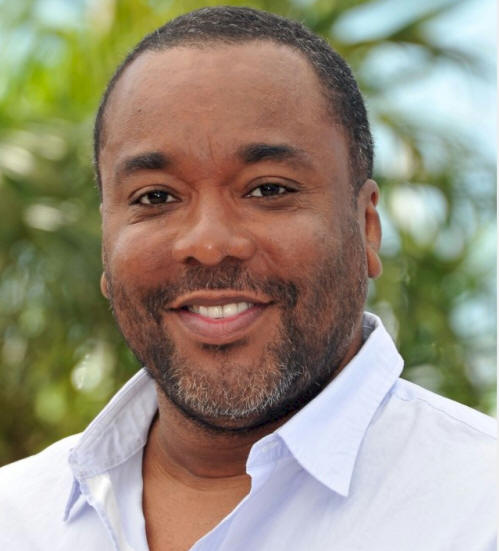
Photo by Pascal Le Segretain – © 2012 Getty
Images
Lee Daniels is best known for directing and producing the Academy Award-winning film Precious which was nominated for a half-dozen Oscars in 2010, including his two for Best Picture and Best Director. Mo’Nique won for Best Supporting Actress while scriptwriter Geoffrey Fletcher landed another for Best Adapted Screenplay.
Lee’s production company, Lee Daniels Entertainment, made its feature film debut in 2001 with Monster’s Ball, the dysfunctional family drama for which Halle Berry would earn her historic, Best Actress Oscar. Last year, he wrote, produced and directed The Paperboy, an adaptation of the Pete Dexter novel starring Matthew McConaughey, Zac Efron, John Cusack, and Nicole Kidman.
Here, he talks about his new picture, The Butler, a civil rights epic recounting the real-life story of an African-American who served in the White House at the pleasure of eight presidents, from 1952 to 1986.
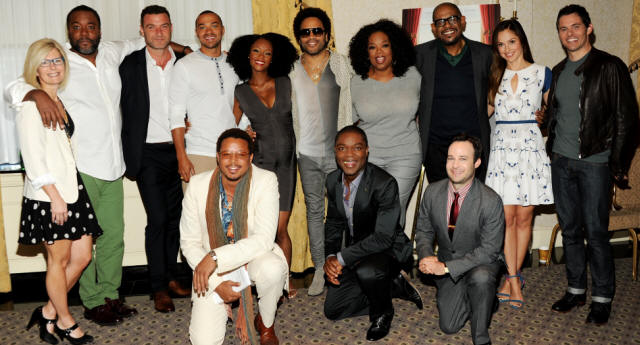
NEW YORK, NY - AUGUST
05: (2L Top) Lee Daniels, Liev Schreiber, Jesse Williams, Yaya Alafia, Lenny
Kravitz, Oprah Winfrey, Forest Whitaker, Minka Kelly, James Marsden,
Terrence Howard, David Oyelowo and Danny Strong attend the press conference
for The Weinstein Company's LEE DANIELS' THE BUTLER at Waldorf Astoria Hotel
on August 5, 2013 in New York City. (Photo by Ben Gabbe/Getty Images for Lee
Daniel's THE BUTLER)
The “Lee Daniels’ The Butler” Interview
with Kam Williams
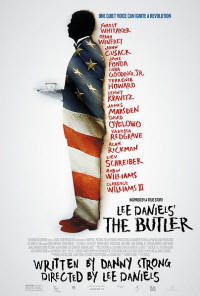 Kam Williams: Hey Lee, what a phenomenal film!
Kam Williams: Hey Lee, what a phenomenal film!
Lee Daniels: Did you like it?
KW: I loved it!
LD: Thanks, Kam.
KW: I was born in the Fifties so all of the ground you cover in terms of the father-son relationship and the Civil Rights Movement resonated with me and touched me very deeply.
LD: That makes me feel good. Thank you very much.
KW: So, what inspired you to make the movie?
LD: What attracted me to the project was the father-son story which I looked at as a love story with the Civil Rights Movement as a backdrop. That was intriguing to me both because I’d had issues with my own dad, and because I have issues with my teenage son. I think the father-son love story is a universal one which transcends color. That’s what was sort of there on the page, but it wasn’t until I started shooting that we began getting into the Woolworth’s sit-ins and the Freedom Riders with the Molotov cocktails that I asked myself, “What have I stumbled upon?” It was then that I realized the film was much bigger than just the father-son story.
KW: Did you decide to tackle the civil rights material because of the Trayvon Martin shooting?
LD: No, it hadn’t happened when Danny Strong wrote the script, including the line “Any white man can kill any of us at any time and get away with it.”
KW: You got Oscar-winners in Forest Whitaker, Cuba Gooding, Jr., Jane Fonda, Vanessa Redgrave, Robin Williams and Melissa Leo, and Oscar-nominees in Terrence Howard and Oprah Winfrey to come aboard. How were you able to assemble such an outstanding cast?
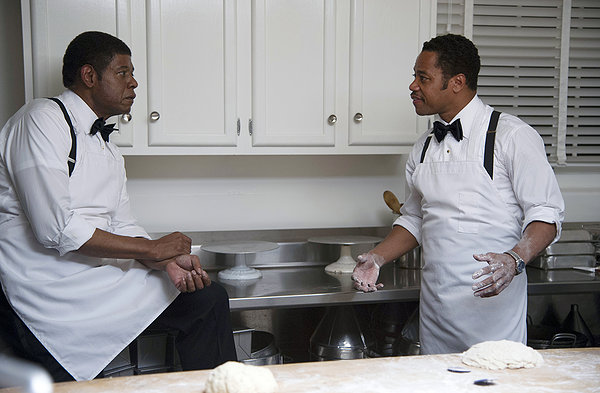
LD: My usual way… throwing out a net, and fishing. [LOL] This one was easy
because the material was so good. The actors I approached took the bait
because they wanted to serve the material. We really didn’t have any money
to pay them, so most of them lost money in relation to what their normal
acting fee would be.
KW: Harriet Pakula-Teweles asks: How has the tempest over re-using the title
The Butler affected you?
LD: Well, I just finished editing the movie five days ago. When did you see
it, Kam?
KW: Earlier today.
LD: Well, I’m not sure which version you saw. Anyway, when I’m working on a
movie, it’s like being in a cocoon. I consider it like giving birth, and I
don’t leave the bubble, because if I do, then it’s bad and affects the
child. But I was pulled out for a minute when my kids told me about
something they saw online. I didn’t even hear about it from the studio. It
disturbed me, but I didn’t have time to think about it.
KW: Well, it’s now called Lee Daniels’ The Butler.
LD: The MPAA [Motion Pictures Association of America] gave me that title and
I still don’t know how to feel about it. I just finished giving birth to the
movie. “Lee Daniels’ The Butler!” It sounds like “The Greatest Show on
Earth!”
KW: Well Tyler Perry, Dino De Laurentis and
others are famous for placing their names before the title?
LD: I’m not Tyler Perry. I’m not Dino De Laurentis. I think it’s a bit much
to put one’s name in front of the film. It makes me uncomfortable. Here’s
the thing. Insiders like you know the whole story and about the legal
issues, but not the average person. I worry that young kids in Oklahoma or
Alabama might end up asking, “Who is this filmmaker to be so full of
himself?” That bothers me. The MPAA handed down this edict. So, I don’t know
how I feel about it right now. Ask me tomorrow. [Chuckles]
KW: My eyes must have welled up at least a half-dozen times while watching
the film. As the director, you must be too close to the film for it to have
that sort of emotional effect on you.
LD: No, when I actually sat down all alone to watch the final cut just for
pleasure, I broke down in tears.
KW: You did a masterful job of portraying the tensions and differences
between the Civil Rights and Black Power Generations.
LD: There was no right and wrong. Cecil [played by Forest Whitaker] was
right and so was his son [played by
David Oyelowo].
You’ve got a problem when neither is wrong, yet you have a conflict.
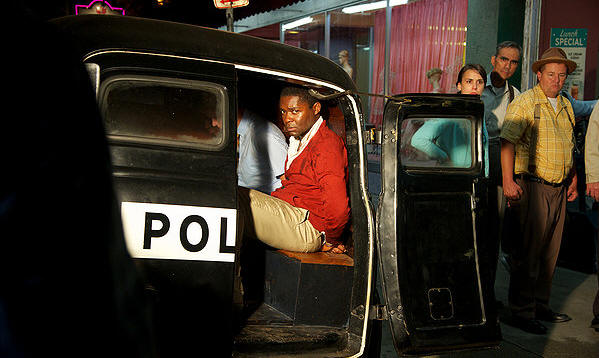
KW: I also appreciated the evenhanded way in which you approached each of
the presidents Cecil served under, like how Reagan could give his
African-American help a raise to make their pay equal to that of whites,
while hypocritically still supporting Apartheid in South Africa.
LD: Ain’t that interesting? We don’t make Kennedy out to be a Goody
Two-Shoes either.
KW: Editor/Legist Patricia Turnier was wondering whether you’ve seen the TV
miniseries Backstairs at the White House?
LD: I did. I think it was a great movie for its time, but I wanted to avoid
the episodic feeling of that film.
KW: Patricia also asks: What message do you want the public to take away
from The Butler?
LD: I hate that question, Patricia, because it forces me to be
philosophical… I think the message is that we have got a long way to go. I
hope that this film rips a scab off the sore that is racism in America
today.
KW: Thanks again for the time, Lee, and best of luck with the film.
LD: Thanks, Kam.
AALBC.com's comments powered by Disqus
Related Links
The “Empire” Interview with Lee Daniels (2015)
A 2009 Interview with Lee Daniels about his film Precious
Forest Whitaker - The Lee Daniels’ The Butler Interview
The
Butler: A Witness to History
Order Book From Amazon.com
by Wil Haygood
Hardcover: 112 pages
Publisher: 37 Ink (July 30, 2013)
Language: English
ISBN-10: 1476752990
ISBN-13: 978-1476752990
Product Dimensions: 7.6 x 6.1 x 0.7 inches
When acclaimed Washington Post writer Wil Haygood had an early hunch that
Obama would win the 2008 election, he thought he’d highlight the singular
moment by exploring the life of someone who had come of age when segregation
was so widespread, so embedded in the culture as to make the very thought of
a black president inconceivable. He struck gold when he tracked down Eugene
Allen, a butler who had served no fewer than eight presidents, from Harry
Truman to Ronald Reagan. During his thirty-four years of service, Allen
became what the Independent described as a “discreet stagehand who for three
decades helped keep the show running in the most important political theatre
of all.”
While serving tea and supervising buffets, Allen was also a witness to
history as decisions about America’s most momentous events were being made.
Here he is at the White House while Kennedy contemplates the Cuban missile
crisis; here he is again when Kennedy’s widow returns from that fateful day
in Dallas. Here he is when Johnson and his cabinet debate Vietnam, and here
he is again when Ronald Reagan is finally forced to get tough on apartheid.
Perhaps hitting closest to home was the civil rights legislation that was
developed, often with passions flaring, right in front of his eyes even as
his own community of neighbors, friends, and family were contending with Jim
Crow America.
With a foreword by the Academy Award– nominated director Lee Daniels, The
Butler also includes an essay, in the vein of
James Baldwin’s jewel The
Devil Finds Work, that explores the history of black images on celluloid and
in Hollywood, and fifty-seven pictures of Eugene Allen, his family, the
presidents he served, and the remarkable cast of the movie.
Wil Haygood been described as a
cultural historian and is the author of other biographies (King
of the Cats: The Life and Times of Adam Clayton Powell and
In Black and White: The Life of Sammy Davis , . Haygood has
been awarded a 2013-14 National Endowment for the Humanties Fellowship.